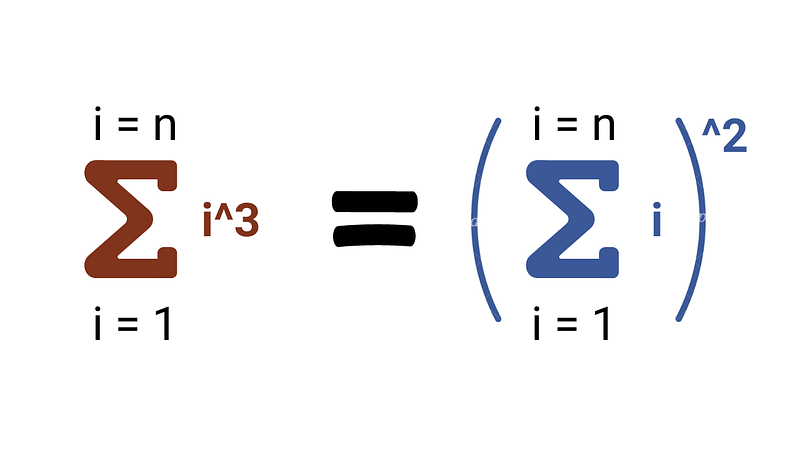For i = 1 to n, Sum of Cubes is Equal to Square of the Sum
Related tags:
math-for-computer-scienceProblem Statement
Prove that the sum of the cubes of the first n positive integers is equal to the square of the sum of the first n positive integers. How can we do this? Let's think!
 Proof using Induction
Proof using Induction
If there is such types of complex relation in terms of n, we can think to apply the powerful idea of mathematical induction. To proceed with the inductive proof, we need to first set the inductive hypothesis: Suppose the above equation holds true for n i.e. 1³ + 2³ + 3³ + … + n³ = (1 + 2 + 3 + … + n )². Now we need to prove that if the equation holds for n, it also holds true for n + 1 =>
1³ + 2³ + 3³ + … + n³ + (n + 1)³ = (1 + 2 + 3 + … + n + (n + 1))²
Now our goal is to prove that left-hand side (LHS) and right-hand side (RHS) are equal. For this, we can simplify the RHS of the equation. Here LHS = 1³ + 2³ + 3³ + … + n³ + (n + 1)³, and RHS = (1 + 2 + 3 + … + n + (n + 1))².
Suppose, A = 1 + 2 + 3 + … + n, and B = n + 1.
Now RHS = (A + B)² = A² + B² + 2AB = (1 + 2 + 3 + … + n)² + (n + 1)² + 2(n + 1)(1 + 2 + 3 + … + n)
As we know from inductive hypothesis (1 + 2 + 3 + … + n)² = 1³ + 2³ + 3³ + … + n³.
Now RHS = 1³ + 2³ + 3³ + … + n³ + (n + 1)² + 2(n + 1)((1 + 2 + 3 + … + n).
As we know, 1 + 2 + 3 + … + n = n(n + 1)/2
Now RHS = 1³ + 2³ + 3³ + … + n³ + (n + 1)² + 2(n + 1)n(n + 1)/2 = 1³ + 2³ + 3³ + … + n³ + (n + 1)² *(1 + n) = 1³ + 2³ + 3³ + … + n³ + (n + 1)³ = LHS
Both LHS and RHS hold true for n + 1. So above equation will hold true for all positive integers n by induction. The best thing is: One can apply the idea of mathematical induction to prove several complex theorems in computer science and math. Enjoy and explore!
Similar question to practice using induction
- Prove that, (for i = 1 to n) sum of i*(i + 1) = n(n + 1)(n + 2)/3.
- Prove that, (for i = 1 to n) sum of (1/2)^i = 1 — (1/2)^n.
- Prove that, (for i = 1 to n) sum of i *2^i = (n — 1)*2^(n + 1) + 2.
More blogs to explore
Just like programming, math is one of the core parts of learning data structures and algorithms. We mainly use math to analyse efficiency of various algorithms. But sometimes, the problem itself contains mathematical property or requires some mathematical insight to find a solution.
There are 3 doors behind which are two goats and a car. You pick door 1 hoping for the car but don’t open it right away. Monty Hall, the game show host who knows what's behind the doors, opens door 3, which has a goat. Here's the game: do you want to pick door No. 2? Is it to your advantage to switch your choice?